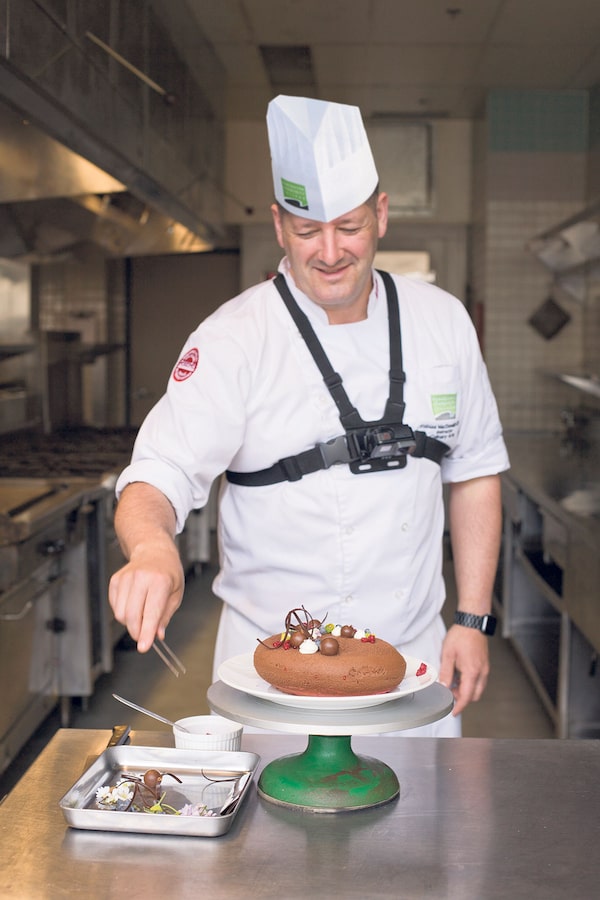
Since Vancouver Community College’s health-care students are in demand on the front line of the pandemic, the college has remained open and instructors comply with all COVID-19 safety protocols.SUPPLIED
Colleges and institutes across Canada have played a key role in the response to the coronavirus pandemic – collaborating to support students, communities and industry while working to contribute to a just recovery.
In British Columbia, for example, Vancouver Community College (VCC) partnered with Vancouver Coastal Health to ensure its students were work-ready under COVID-19 conditions. At the community level, VCC made its Broadway campus parking lot available for coronavirus testing, collected and donated more than 60,000 items of PPE and partnered with the City of Vancouver to make more than 80,000 meals so far for vulnerable community members. To continue to equip their students to serve the organizations depending on their skills, VCC’s faculty and staff made a rapid shift to online course delivery, even in programs like culinary training and automotive repair that have traditionally been entirely hands-on.
“Many of our courses are very experiential, so we had to deliver as much as we could online, while also building a safety plan to bring students back in to give them those essential hands-on skills,” says Dennis Innes, the college’s dean of hospitality, food and business.
It was an immersive, exploratory experience on an urgent timeline, experimenting with how to deliver each learning component in an entirely new world. “Our Centre of Teaching, Learning and Resources supported us in providing hands-on training online as much as possible, using technology like Zoom, Moodle and GoPros,” says Mr. Innes. “We started creating videos of the work that the chefs and bakers were doing and playing with synchronous and asynchronous delivery. We’re now creating a virtual reality kitchen and recipes.”
While it was exhausting and difficult, it was also exciting for faculty and students to discover what worked well online, he says. This new depth of innovation was essential training for students who will work in industries that are now evolving in unpredictable ways. “They have a new toolkit for learning and collaborating online, and in self-directing learning and time management. They’ll be taking these foundational skills and techniques and innovating with them when they get into industry,” says Mr. Innes.

Chef instructors use GoPro and other video cameras to record and deliver classes online as part of hybrid program delivery.SUPPLIED
The college’s School of Health Sciences also had to transform its programs almost overnight in response to COVID safety requirements and soaring demand for its graduates. “VCC is known for its students being hired immediately after graduation, but in the pandemic, they’ve become even more vital,” says the school’s dean Jo-Ellen Zakoor. “We had a group of LPN-BSNs who were close to completing, and we had to figure out how to get them into preceptorships. Once we did that in a safe way, the graduates were being hired almost on the spot.”
COVID has inspired powerful new collaborations between schools, the health authorities, the ministries of Advanced Education and Health, and the regulatory bodies under which the students will be licensed, Ms. Zakoor stresses. One example, a new collaboration between Vancouver Coastal Health, Providence Health and VCC, the Health Career Access Program is designed to provide skilled caregivers to long-term facilities. “The student is hired by the health authority to work in a non-direct care role while they’re coming to VCC to take the health care assistant program in a modular way.”
“Over the course of 2020, our team has risen to the myriad of challenges presented by this unexpected COVID-19 pandemic in ways that have consistently impressed me,” says VCC president and CEO Ajay Patel. “Our students, staff, faculty and alumni contribute in profound ways to our economy and the welfare of our province. We don’t just train students to be successful in their careers – we foster citizens who care deeply about their communities.
“Through all this, we have continued to provide the skills, experiential education and support our students need to reach their career goals and contribute to their communities.”
Advertising feature produced by Randall Anthony Communications with Colleges and Institutes Canada. The Globe’s editorial department was not involved.